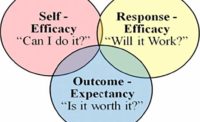
For example, many people believe rape victims are somewhat to blame for the rape. “If she hadn’t dressed and acted that way, she would not have been sexually assaulted.” In other research, battered wives were viewed by some as being responsible for their abusive husbands’ behavior.
Social psychologists believe this thinking is a form of self-defense that helps us maintain our belief that life is safe, orderly, and predictable. If life were unfair and random, then innocent people like ourselves could also be victimized and injured.
In psychological terms, this attributional bias is referred to as the “just world hypothesis.” It’s the assumption that people get what they deserve and deserve what they get. How do we deal with the constant reminder that tragedies not only happen, but are also relatively common? One way is to believe in a just world: Bad things happen to bad people and good things happen to good people.
Since most of us see ourselves as decent and basically good, our belief in a just, safe world means bad things won’t happen to us. In the remainder of this article, I’d like to point out four ways that this defense mechanism can hurt our efforts to protect workers on the job.
1. Increased risk-taking
The phrase, “It won’t happen to me,” is familiar to all of us. This belief enables us to face situations where a serious injury is possible — from the drive to and from work to numerous situations while we work. As it turns out, most days this conviction is supported. Nothing happens to us.This belief, obviously consistent with the just world hypothesis, increases risk-taking. We take a chance — a calculated risk — because we think we’re safe and secure in a just world.
Maybe we wouldn’t take as many risks if we realized that our coworkers who suffered injuries also believed in a just world. They didn’t expect anything bad to happen to them — only to the other guy. Now they know what it’s like to be that other guy.
2. Poor incident analysis
Let’s be honest — haven’t you at one time or another tried to feel better about someone getting hurt or killed by looking for things the victim could have done to prevent the incident? Do you feel more sympathy for the passengers than the driver killed in a vehicle crash?We feel safer when we can somehow blame the victim of misfortune. Then the tragedy does not seem so tragic. We feel more secure knowing we could prevent such a misfortune from happening to us by doing what the victim didn’t do.
But the actual or potential behaviors of a victim do not tell the whole story. Any analysis of what happened and why can’t begin and end here. But sometimes it does, and for this we can blame our belief in a just world.
3. Lack of involvement
It’s not easy to get people to actively care for each other’s safety. Not only must we be educated and trained to know what to do, we must feel comfortable intervening and believe it’s the right thing to do.We might be less likely to step in or speak up if we believe that people simply get what they deserve. Why should we bother? Well, you can also believe it’s your responsibility to help make the world just by intervening to make it safer. This includes removing environmental hazards and barriers to safe behavior, as well as helping others become more mindful of their behaviors that put themselves and others at risk for injury.
4. Lack of public support
When hazards and injuries seem unfair, as when a child is molested or inflicted with a deadly disease, the public pays special attention. It’s comparably easy to obtain contributions or voluntary assistance for programs that target vulnerable populations, like physically challenged individuals or learning-disabled children.Victims of workplace injuries are not viewed as weak and defenseless. Occupational injuries are indiscriminately distributed among employees who take risks, and the just world perception is that they get what they deserve. This helps explain the low public and political support for agencies like OSHA and NIOSH that are charged with protecting employees.
More productive lives of Americans are lost in occupational mishaps and vehicle crashes than cancer and heart attacks combined. Yet the amount of government support for cancer and cardiovascular disease is many times greater than the amount allocated for research and interventions to prevent injuries and fatalities in the workplace and on the road. I believe the just world hypothesis is partly responsible for this unjust situation.
What to do
So what can we do about the just world hypothesis and its impact on workplace safety? We can turn it in our favor. Through education and regular conversations, we can convince people that a just world actually depends on our actions. We can help make our world safer and more just by doing our part to remove environmental hazards, suggest refinements to make equipment more “user friendly,” and help people improve their safety-related behavior.A just world can be an ultimate vision, made possible by our attempts to actively care for the safety and health of ourselves and our coworkers.
Sidebar: Flawed thinking
Believing in a "just world" where people get what they deserve can:- Lead to more risk-taking - because in a just world we don't believe we deserve to get hurt.
- Stifle incident investigations and getting at root causes - because we blame the victim and leave it at that.
- Prevent us from getting involved in safety efforts - because in a just world everything happens for a reason and people get what they deserve, so why should we bother?
- Reduce public funding for government agencies that target occupational safety (OSHA, MSHA, and NIOSH) - because workers injured on the job get what they deserve. In comparison, EPA gets a bigger budget because it protects children and families unfairly exposed to pollution threats.


